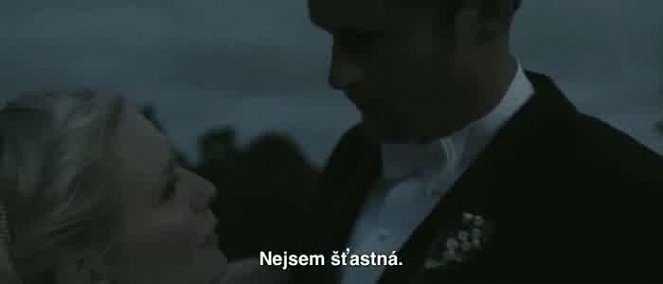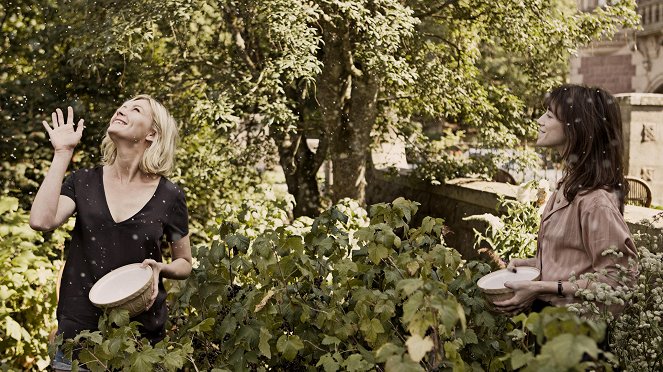Directed by:
Lars von TrierScreenplay:
Lars von TrierCinematography:
Manuel Alberto ClaroCast:
Kirsten Dunst, Charlotte Gainsbourg, Kiefer Sutherland, Charlotte Rampling, Udo Kier, Alexander Skarsgård, Stellan Skarsgård, John Hurt, Jesper Christensen (more)VOD (4)
Plots(1)
Justine (Kirsten Dunst) and Michael (Alexander Skarsgård) are celebrating their marriage at a sumptuous party in the home of her sister (Charlotte Gainsbourg) and brother-in-law (Kiefer Sutherland). Meanwhile, the planet, Melancholia, is heading towards Earth... Melancholia is a psychological disaster movie from director Lars von Trier. (Magnolia Pictures)
(more)Videos (2)
Reviews (9)
A pure pleasure. The opening is flawless, the finale fatal. It is excellent for lovers of Richard Wagner and Kirsten Dunst's bust and dimples. The pleasure is multiplied, of course, in the Justine section, which has everything and lacks nothing. Humor is combined with absurdity and symbolism. Why waste the primitive aspects of Udo Kier when we have Alexander Skarsgård's wonderful newlywed games? He hasn't been this close to orgasm since True Blood, and that's saying something.
()
They should have cast Bruce Willis instead of Sutherland; only with that savior of our plant “asteroid my ass" would Trier throw an ironic grin at the audience; Jack Bauer is just too little time for something of that caliber. But seriously, now... A surreal “music video" of Wagner, Forman-style wedding and Trier in an intimate, emotional, but still visually most powerful ever end of the world. Several parts of it really manage to get across that specific atmosphere and the feelings typical for states of melancholy which you see/experience very rarely in movies.
()
My first meeting with Lars von Trier went very well. After the breathtaking introduction I was sorry I didn't catch Melancholia in the movie theatre. After the first part I was delighted and after the following part I was slightly confused but still extremely satisfied. The combination of handheld "earth" camera, "space" views (of which there are not many), music (Wagner!) and perfect acting performances (with the unbeatable Kiefer Sutherland in the lead) was a success. I probably didn't understand everything, but that's why I'll gladly watch the film again in the future.
()
The first, not very exciting (worthy of three-stars) half is excellently acted, with a nice variety of international stars in supporting roles. However, it doesn’t bring anything more to the table than any conversation scene from any of Trier’s (or Ozon’s) other films. The second (four-stars), more oppressive, more impressive, visually beautiful half of the film, which is also more interesting in terms of the script, intensifies the experience, resulting in the audience being dazzled by the artistic audiovisuals but perplexed and unfulfilled by the content. It’s as if Trier was just experimenting, trying to materialize a feeling, an idea from a short verse. For some, it may be an interesting and clever meditation (after all, it is an extremely elegant game with pictures, music and characters), but for me Melancholia remains only a handful of positive impressions rapidly fading away after the end credits.
()
After comedy, musical and horror, Lars von Trier ruins another genre and I bite it hook, line and sinker. The best film of the first half of 2011 and a purely emotional affair about the end of good things (not necessarily the world), pointless hopes and relationships. What captivated me the most was the evolution of the two main characters. Even though the film can be seen as a poem about the end of the world, there are couple moments that open the door for the most diverse interpretations (the 19th hole, the gangway that can’t be easily crossed, the celestial bodies that behave as if they didn’t know basic school physics). Lars von Trier is number one in the list of my favourite Nazis. That was the review, now a short spoiling interpretation to think about: In the first part of the film they say that John’s golf course has 18 holes, but in the second part we see Claire and her son at the 19th hole. This means that at least one part of the film is not real, or that it is based on reality, but it takes place in a different way than we what we can see. The key is in the conversation in the first part that stresses the fact that the course has 18 holes. That’s nonsense. 18 hole courses are standard, why would the characters explicitly point that out? They would point it out only if John’s course had a non-standard number of holes. We have therefore reason to believe that the events in first part of the film take place in a different way than we what see. We see all of them through the eyes of Justine (after whom the chapter is titled), who, facing the end of the world, transforms the apocalypse into a botched wedding in a world where the planet Melancholia is only a dot in the sky that reminds that whatever happens, things can always get worse (regardless of whether the wedding is a memory or fiction). The world in the first part of the film is a desired world without the 19th hole / without a final and unsolvable problem. So, even though Melancholia left me with a pretty unpleasant feeling right after watching it, after some time what I get is a cynical, though essentially positive message: never mind earthly worries, things will be worse when the universe starts making trouble. But it doesn’t really matter what Lars thought, anyone who willing can find something for themselves, the rest can ignore it. That’s the beauty of post-modernism. PS: Plenty of Visigoths left the cinema, lol.
()



Ads